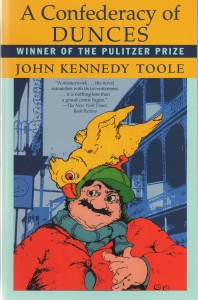 Wacky People Doing Wacky Things
Wacky People Doing Wacky Things
Toole, John Kennedy (1980) A Confederacy of Dunces. New York: Grove Press.
The main character, Ignatius J. Reilly, is a modern-day Don Quixote, a manic, tragi-comic, delusional soul who believes, or at least pretends, that only he understands what is right, good, and true.
Beyond that, the similarity ends, for Reilly is an obese, slothful, arrogant, self-righteous, unemployed baboon of a person who lives with, and off of, his mother in a rundown house in New Orleans. He lies, brags, complains, eats, drinks, pronounces, belches, farts, masturbates, vomits, and waddles his way through the book. He’s a very disagreeable character, and that’s a challenge for some readers, but you have to admit, it’s a triumph of good writing when you dislike a character that much.
There is no plot, not even a theme. The book is structured as a picaresque series of scenes and mini-adventures involving ostensibly wacky characters, loosely connected. It ends (unsatisfactorily) simply when the steam is exhausted.
The book’s main virtue is that it’s supposed to be very funny. I’m always wary of books advertised as funny, ribald, hilarious, or “destined to become a classic.” That’s especially true when I see superlatives such as, “It will make you laugh out loud till your belly aches and your eyes water.” – The New Republic. Well, that didn’t happen when I read it. I smiled a few times, mainly in the first hundred pages before I got bored. How funny are fat jokes, really?
The book has become a classic, more of a cult classic I would say, although, there’s no denying that it inexplicably won the Pulitzer Prize in 1981.
Besides the low humor of body function jokes, which I haven’t enjoyed since I was twelve, there are some ironic and sarcastic lines that raise the mean. You have to accept the not-believable premise that Ignatius has earned a Master’s degree in medieval studies. That allows him to pontificate and criticize in wonderfully pedantic ways. When his (temporary) employer asks him about the filing he hasn’t done, Ignatius explains,
“Oh, that. Yes. Well, when I opened the first drawer this morning, I was greeted by a rather large rat which seemed to be devouring the Abelman’s Dry Goods folder. I thought it politic to wait until he was sated. I would hate to contract the bubonic plague and lay the blame upon Levy Pants” (p.95).
That’s deliciously dry, intellectual humor that also reveals the character well, and there’s plenty of it to make a reader smile, until it becomes repetitive and tedious, which for me, happened quickly.
The same adaptation occurred for the many “colorful” characters who popped up in the book. Many are memorable, and all are genuinely original, I admit that, but all are flat, stereotypical characters, not round. Even Ignatius is flat, despite his manifest rotundity. I especially enjoyed Jones, the janitor. Here he is talking to the bartender at work:
“You want another beer?”
Jones looked at the old man through his sunglasses and said, “You tryina sell me another beer, a poor color boy bustin his ass for twenny dollar a week? I think i’ about time you gimme a free beer with all the money you make sellin pickle meat and sof drink to po color peoples. You sen you boy to college with the money you been makin in here.”
…”Well, if conditions really bad…”
“’Really bad’? Hey! I’m workin in modern slavery. If I quit, I get report for bein vagran. If I stay, I’m gainfully employ on a salary ain even startin to be a minimal wage.” (p. 143)
Jones is a funny character, but only as caricature. He has no interior.
So, the book has virtues, is well written, will make you at least smile if you tend not to LOL. But it’s flat and its humor wears thin, and it doesn’t go anywhere or add up to anything.
